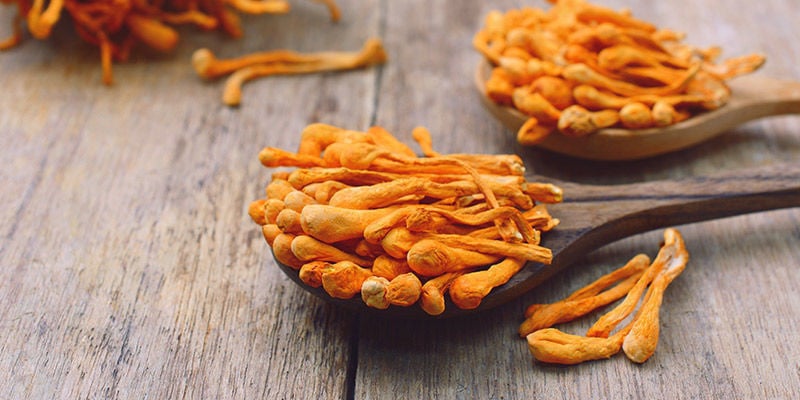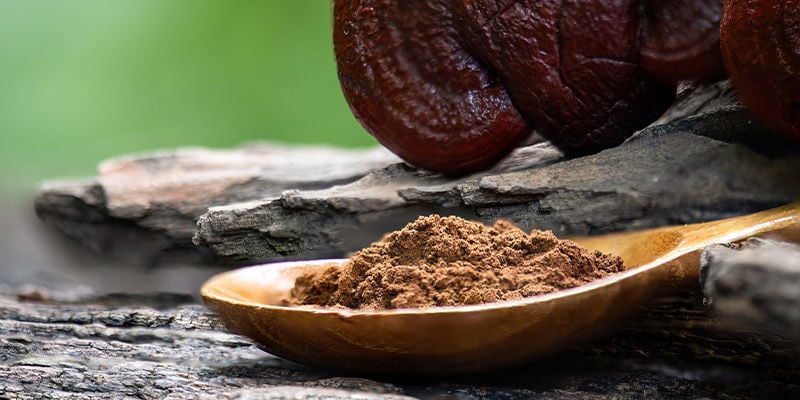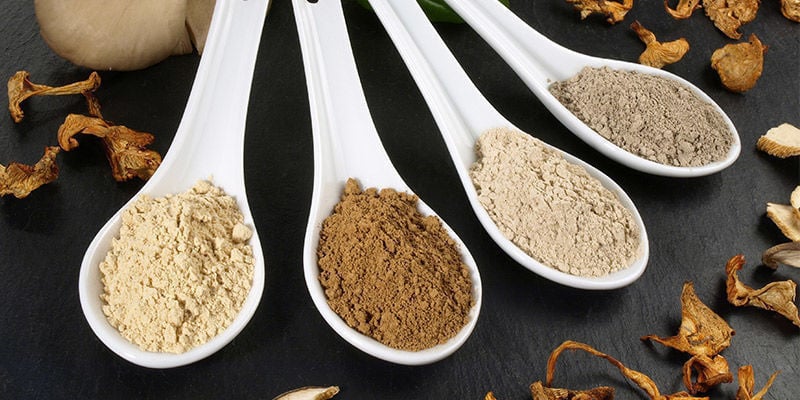
Do Mushrooms Have Health Benefits?
Mushrooms: they're weird, they're wonderful, and it turns out they're really healthy too! Here we look at the varied health benefits of eating a range of edible mushrooms.
Mushroom consumption appears to be good for us. While they’re no magical cure-all, mushrooms have been vastly underutilised, at least in the West. With that said, it’s worth pointing out that various East Asian cultures have long used mushrooms for a wide range of purposes, and so the credit must go to them.
Though around 100 species of mushroom are considered “edible”, which is different from “not poisonous”, only three species are commonly grown and consumed: white button mushrooms (Agaricus bisporus L.), oyster mushroom (Pleurotus ostreatus L.), and paddy straw mushroom (Volvariella volvacea L.). On top of these three, there are around 30 others that are cultivated for consumption.
In what follows, we take a look at what’s inside mushrooms and how they might be able to positively benefit our health!
Are mushrooms good for you?

Most edible mushrooms have some health benefits. In fact, mushrooms are considered to be the main underutilised source of nutrition (Kumar, 2021). From simple nutritional benefits to more complex nootropic benefits, different species of both farmed and wild mushrooms might be able to benefit your health. They’re very in vogue right now, so it’s important not to get lost in the hype and to understand, though boring to say, that they must be consumed as part of a healthy and balanced diet. They’re not going to fix all your woes by themselves!
Some popular mushrooms that are revered for their potential health benefits include:
- Reishi
- Lion’s mane
- Turkey’s tail
- Shiitake
- Oyster mushrooms
- Chaga
- Cordyceps
Do mushrooms have health benefits when raw or cooked?

Although it differs from species to species, cooked mushrooms are generally considered to be healthier than raw. Not only will cooking break down toxins (if present), but heating is also thought to release various nutrients contained within certain mushrooms. On top of that, some mushrooms just taste better cooked, so you'll want to find a balance between benefits and taste, especially if you want to integrate them regularly into your meals. With that said, however, certain methods of preparation, such as boiling and frying, can result in a loss of nutrients, including water-soluble nutrients and protein, respectively. As such, grilling, a quick sauté, and, perhaps surprisingly, microwaving are believed to retain the most nutrients when cooking mushrooms.
In time-honoured medicinal practices, it’s quite common to brew mushroom teas as a way of imbibing their benefits. So you could also consider doing this, in addition or as an alternative to eating certain mushrooms. Otherwise, you can take liquid extracts or capsules filled with mushroom powder.
What do mushrooms do for you body?

Below, we examine some of the proposed benefits of edible mushrooms. While some of the following scientific research is backed up with substantial clinical trials, some of it is inconclusive and still in the preliminary stages. So be sure to conduct more research into the benefits of specific mushrooms if you're interested in exploring this topic further.
Vitamin D source
Looking for a natural source of vitamin D in winter? Mushrooms might just be for you. Much like humans, mushrooms also produce vitamin D when exposed to UV light. This can happen during the growing process, but you can also leave freshly picked mushrooms under UV light (natural and artificial) for 15–120 minutes; this is thought to enhance the concentration of vitamin D by 10 mcg for every 100 grams of fresh weight.
Immunomodulating nutrients

Mushrooms are a good source of compounds called polysaccharides (Jayachandran, 2017). One example of this is beta-glucan, which can activate parts of the immune system including, but not limited to, killer cells and macrophages. These mechanisms help to improve the general immune system and may also impact the growth of tumours. As well as polysaccharides, mushrooms also contain important B vitamins such as selenium, which supports the immune system and can help to prevent damage to cells and tissues.
Support neurodegenerative conditions
Some research has aimed to determine if certain mushrooms might be able to help slow neurodegenerative conditions. One study examined if mushrooms such as reishi may have some value when it comes to neurodegenerative conditions like Alzheimer’s (Phan, 2015). However, the authors did note that all of their findings came from in vitro tests, so clinical trials are required before any conclusions can be drawn.
Cholesterol and blood pressure

Edible mushrooms have been shown to reduce low-density lipoprotein (LDL) cholesterol, high-density lipoprotein (HDL) cholesterol, total cholesterol, and triglycerides (Krittanawong, 2020). Although the authors of this paper concluded that “edible mushroom consumption has not been shown to conclusively affect cardiovascular risk factors to date”, they went on to say that they may still have some related benefits, including “a favorable alteration of lipid profiles and blood pressure reduction”.
Gut health
Mushrooms are prebiotic, which means that they contain compounds that can feed good bacteria in the intestines and stomach. As such, they are thought to be able to improve the gut biome, which, though poorly understood, is believed by some to potentially have significant effects on overall well-being. What’s more, mushrooms seem to be able to inhibit exogenous pathogens in the gut, which can help to avoid poor health (Jayachandran, 2017).
Antioxidants

Mushrooms are high in antioxidants, which destroy free radicals and can help to influence the inflammatory response. Regarding the consumption of edible mushrooms in a person’s diet, it’s thought that these antioxidant effects may be able to positively impact obesity by protecting against obesity-related hypertension and dyslipidemia (Ganesan, 2018), among other possible applications.
Is it healthy to eat mushrooms every day?

Eating mushrooms every day can certainly be healthy, so long as it’s not at the expense of other varied foods. Some proponents of nootropic mushroom consumption have a daily routine, taking their mushrooms as extracts or capsules. So not only is it okay to eat mushrooms on a daily basis, but it may in fact enhance some of their benefits.
How nutritional are mushrooms?
Mushrooms are highly nutritional. Some more than others, and so you shouldn’t expect a single species of mushroom to deliver everything listed here. However, here are some of the compounds you’ve probably never heard of that can be found in mushrooms:
- Phenolics
- Terpenoids
- Polysaccharides
- Glucans
- Lectins
- Lignocellulose-degrading enzymes
- Proteases
- Ribosome-inactivating proteins
- Protease inhibitors
- Hydrophobins
There's more to mushrooms than meets the eye

Mushrooms are strange beings, but they’re also very healthy in many cases. And don’t just take our word for it; there’s plenty of modern scientific evidence to back up their nutritional benefits. And this knowledge is not new, though it might seem like it to some of us. But mushrooms have actually been popular in both cuisine and medicine for millennia, especially in East Asia where, even today, they form a crucial part of traditional holistic practices.
So, the modern world and the ancient are united in the understanding that mushrooms are good for us. So include them in your diet!
- Ganesan K, & Xu B. (11/05/2018). Anti-Obesity Effects of Medicinal and Edible Mushrooms - https://pubmed.ncbi.nlm.nih.gov
- Jayachandran M, Xiao J, & Xu B. (09/08/2017). A Critical Review on Health Promoting Benefits of Edible Mushrooms through Gut Microbiota - https://pubmed.ncbi.nlm.nih.gov
- Krittanawong C, Isath A, Hahn J, Wang Z, Fogg SE, Bandyopadhyay D, Jneid H, Virani SS, & Tang WHW. (2021 May). Mushroom Consumption and Cardiovascular Health: A Systematic Review - https://pubmed.ncbi.nlm.nih.gov
- Kumar K, Mehra R, Guiné RPF, Lima MJ, Kumar N, Kaushik R, Ahmed N, Yadav AN, & Kumar H. (12/04/2021). Edible Mushrooms: A Comprehensive Review on Bioactive Compounds with Health Benefits and Processing Aspects - https://pubmed.ncbi.nlm.nih.gov
- Phan CW, David P, Naidu M, Wong KH, & Sabaratnam V. (2015). Therapeutic potential of culinary-medicinal mushrooms for the management of neurodegenerative diseases: diversity, metabolite, and mechanism - https://pubmed.ncbi.nlm.nih.gov
-
 7 min
December 5, 2024
Which Mushrooms Are Best To Eat?
Mushrooms are some of Earth's most compelling life forms. In this article, we're focusing on 11 of the healthiest mushrooms to include in your diet. Whether incorporated whole into meals or taken...
7 min
December 5, 2024
Which Mushrooms Are Best To Eat?
Mushrooms are some of Earth's most compelling life forms. In this article, we're focusing on 11 of the healthiest mushrooms to include in your diet. Whether incorporated whole into meals or taken...
-
 5 min
November 6, 2024
Which Mushrooms NOT To Eat: A Quick Guide
You probably know that some mushrooms can be extremely poisonous, but you may not know much more than that. In this article, we take a look at 18 poisonous mushrooms found throughout the world....
5 min
November 6, 2024
Which Mushrooms NOT To Eat: A Quick Guide
You probably know that some mushrooms can be extremely poisonous, but you may not know much more than that. In this article, we take a look at 18 poisonous mushrooms found throughout the world....
-
 6 min
July 4, 2023
Top 10 Rare Superfoods To Boost Well-Being
Looking to take your healthy diet and lifestyle to the next level? Superfoods are packed with nutrients, vitamins, and minerals, and can help make an already healthy routine even better. Keep...
6 min
July 4, 2023
Top 10 Rare Superfoods To Boost Well-Being
Looking to take your healthy diet and lifestyle to the next level? Superfoods are packed with nutrients, vitamins, and minerals, and can help make an already healthy routine even better. Keep...
-
 4 min
July 3, 2023
Discover Top 10 Mushrooms For Your Health
With so many varieties of mushrooms available, there's plenty that our funghi friends offer in terms of potential health and well-being benefits for users. What's more is that these mushroom...
4 min
July 3, 2023
Discover Top 10 Mushrooms For Your Health
With so many varieties of mushrooms available, there's plenty that our funghi friends offer in terms of potential health and well-being benefits for users. What's more is that these mushroom...











 United States
United States








